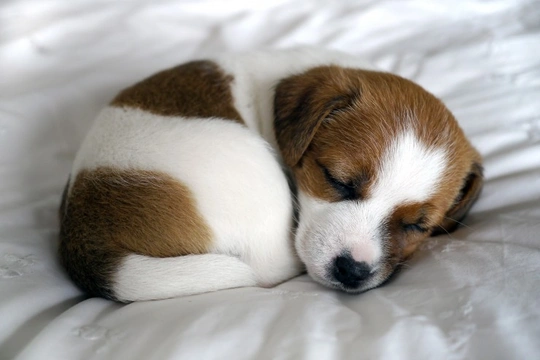
How to tell if your puppy is tired
Puppies tend to sleep more frequently and for longer overall than adult dogs, as the whole process of growing and developing takes a lot of energy, as well as of course the energy expended by exploring the world around them and facing all of the new stimulus puppies face during their first year of life.
Young puppies often seem to fall asleep with no warning and often in some odd places and positions, and a pup that is tired out will often sleep very deeply too.
It is usually very easy to tell when a young pup is tired out as they do just tend to fall asleep in the middle of whatever they are doing, but as puppies get a little older and begin to fall into a more steady routine in terms of their day to day lives, it is not always so simple.
However, learning to tell when your puppy is tired and so, needs to rest or have a break from whatever they are doing is important, and this means knowing how to recognise the signs that your pup is beginning to become weary.
In this article we will share some of the more subtle signs you might pick up on that let you know your puppy is tired. Read on to learn more.
Slowing down on walks
Pups and most adult dogs are very keen to go for their walks, and will tend to show obvious signs of enthusiasm when it is time to go out. However, pups can’t walk as far or for as long as an adult dog, and because they tend to find walks very exciting, they will often expend a lot of energy early on in their walk, and flag a little towards the end.
When your pup starts to slow down on walks, fall behind or be less engaged with exploring things, they’re starting to get tired out so it’s time to head for home.
Stopping for rest
Pausing for a break now and then on walks is normal for both dogs and owners, and gives you both a chance to get your second wind up to carry on. If your pup simply stops on your walk for a break, give them a couple of minutes and see if they want to proceed.
Some pups will just stop wherever they feel like it, sit and refuse to move when tired – particularly dogs of more sedentary breeds that also have a real stubborn streak, like the English bulldog – and this is a clear sign that your pup has had enough and is ready to go home.
Falling asleep when you do stop
Your pup might well wait until you offer them the chance to stop rather than slowing down or stopping of their own volition, but if your pup falls asleep immediately or shortly after you do stop, then they need a rest or a nap to recharge their batteries.
Retreating from play or socialisation
Pups generally love to play with both people and other dogs, and they tend to be very enthusiastic with new friends in the dog park and burn off a lot of energy running around and tussling with the other dogs that they meet.
It is easy for pups to get overexcited and exert themselves too much during play, and when they need a rest or a breather, they will eventually remove themselves from the larger pack and find a quiet corner to catch their breath and potentially, have a nap.
Keep an eye on your pup’s cues and behaviours when playing with others, so that you will notice when they’ve had enough and are ready to return home.
Poor attention span
Fatigue and tiredness aren’t just physical, but mental too. Anything that makes your pup think and engages their brains will also wear them out, which means that training sessions for puppies need to be kept short, varied and interesting.
There is a limit to how long a puppy can concentrate effectively for and enjoy a training session, and this varies according to the pup’s age, as well as their breed and personality.
A pup that is getting mentally fatigued as well as physically tired out won’t be giving their full attention to training or whatever you are doing, and their attention will wander. They might start rolling around, chewing their lead or apparently concentrating on everything except for the task at hand, or again, they might simply fall asleep.
When your pup’s attention span begins to decrease, finish the training session and give your pup a rest.
Acting out
It might seem obvious that when a puppy is tired, they’ll fall asleep. However, if the pup is excited, or the environment they are in isn’t restful, they might display signs of being overtired similar to that which you might see in a young child, such as acting out and being unruly.
Puppies do of course behave in silly ways and sometimes misbehave for all sorts of reasons, whether they are tired or not. But if you think your pup may be overstimulated or overexcited and as a result, they’re beginning to act out, correct their behaviour as appropriate but then take them somewhere quieter to recharge their batteries.



